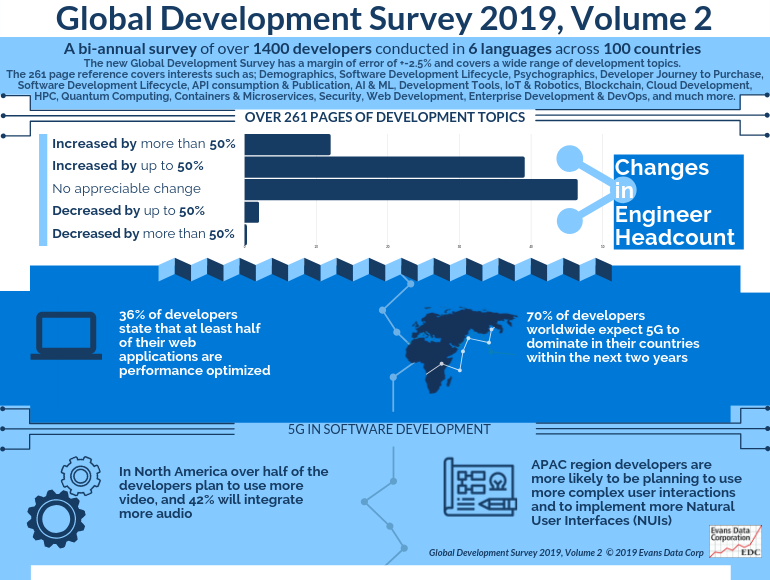StackGen has partnered with Google Cloud Platform (GCP) to bring its platform to the Google Cloud Marketplace.
70% of developers worldwide expect 5G to dominate in their countries within the next 2 years, according to Evans Data’s Global Development Survey.
The survey, conducted in 6 languages across 120 countries, showed a large appetite for 5G, but with significant differences between regions. For example, in North America, where adoption uptake is expected to be the fastest, 80% of developers believe 5G will dominate in 2 years time while 56% estimate it won’t take more than one year, and 28% think it will be dominant in 6 months. Compare this with the EMEA region where only 7% think 5G will dominate in 6 months, and 32% predict 5G dominance within the coming year.
Developers worldwide agree that Internet of Things (IoT) is the area that will most benefit from the capabilities and performance that 5G will bring, although there is a lot of anticipation surrounding Big Data gathering and processing, especially in the APAC region, where over a quarter of the developers feel that will be the biggest capability enhancement.
How will 5G affect software development? In North America over half of the developers plan to use more video, and 42% will integrate more audio. However, in the APAC region developers are more likely to be planning to use more complex user interactions and to implement more Natural User Interfaces (NUIs).
“The benefits of 5G aren’t simply faster connection speeds,” said Janel Garvin, CEO of Evans Data. “5G will bring capabilities for smarter and safer cities, continual interconnectivity, and new ways of interacting with technology.”

Industry News
Tricentis announced its spring release of new cloud capabilities for the company’s AI-powered, model-based test automation solution, Tricentis Tosca.
Lucid Software has acquired airfocus, an AI-powered product management and roadmapping platform designed to help teams prioritize and build the right products faster.
AutonomyAI announced its launch from stealth with $4 million in pre-seed funding.
Kong announced the launch of the latest version of Kong AI Gateway, which introduces new features to provide the AI security and governance guardrails needed to make GenAI and Agentic AI production-ready.
Traefik Labs announced significant enhancements to its AI Gateway platform along with new developer tools designed to streamline enterprise AI adoption and API development.
Zencoder released its next-generation AI coding and unit testing agents, designed to accelerate software development for professional engineers.
Windsurf (formerly Codeium) and Netlify announced a new technology partnership that brings seamless, one-click deployment directly into the developer's integrated development environment (IDE.)
The Cloud Native Computing Foundation® (CNCF®), which builds sustainable ecosystems for cloud native software, is making significant updates to its certification offerings.
The Cloud Native Computing Foundation® (CNCF®), which builds sustainable ecosystems for cloud native software, announced the Golden Kubestronaut program, a distinguished recognition for professionals who have demonstrated the highest level of expertise in Kubernetes, cloud native technologies, and Linux administration.
Red Hat announced new capabilities and enhancements for Red Hat Developer Hub, Red Hat’s enterprise-grade internal developer portal based on the Backstage project.
Platform9 announced that Private Cloud Director Community Edition is generally available.
Sonatype expanded support for software development in Rust via the Cargo registry to the entire Sonatype product suite.
CloudBolt Software announced its acquisition of StormForge, a provider of machine learning-powered Kubernetes resource optimization.













